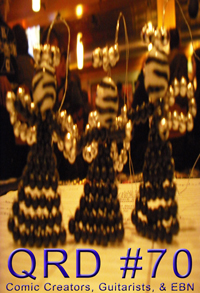
 |
| about
this issue Feature Interview: Electric Bird Noise Guitarist Interviews: Fred Frith Phil Dole Chris Jeely Comic Creator Interviews: Jules Rivera Derek Adnams & Brandon Bullock Graham & Caroline Johnson Martin Malin Mike Rickaby |
 |
 |
 |
 |
 |
 |
 |
|
|
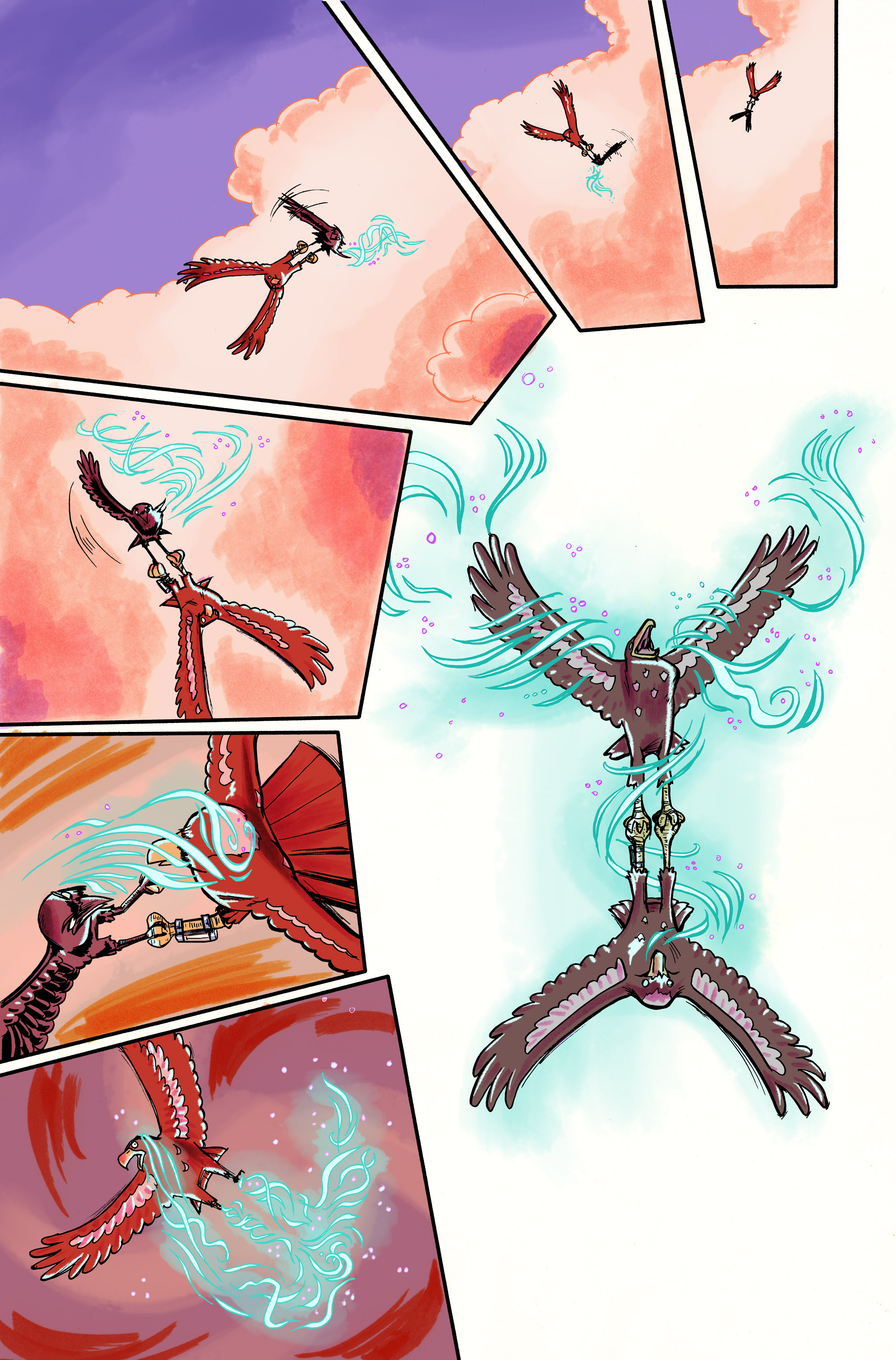 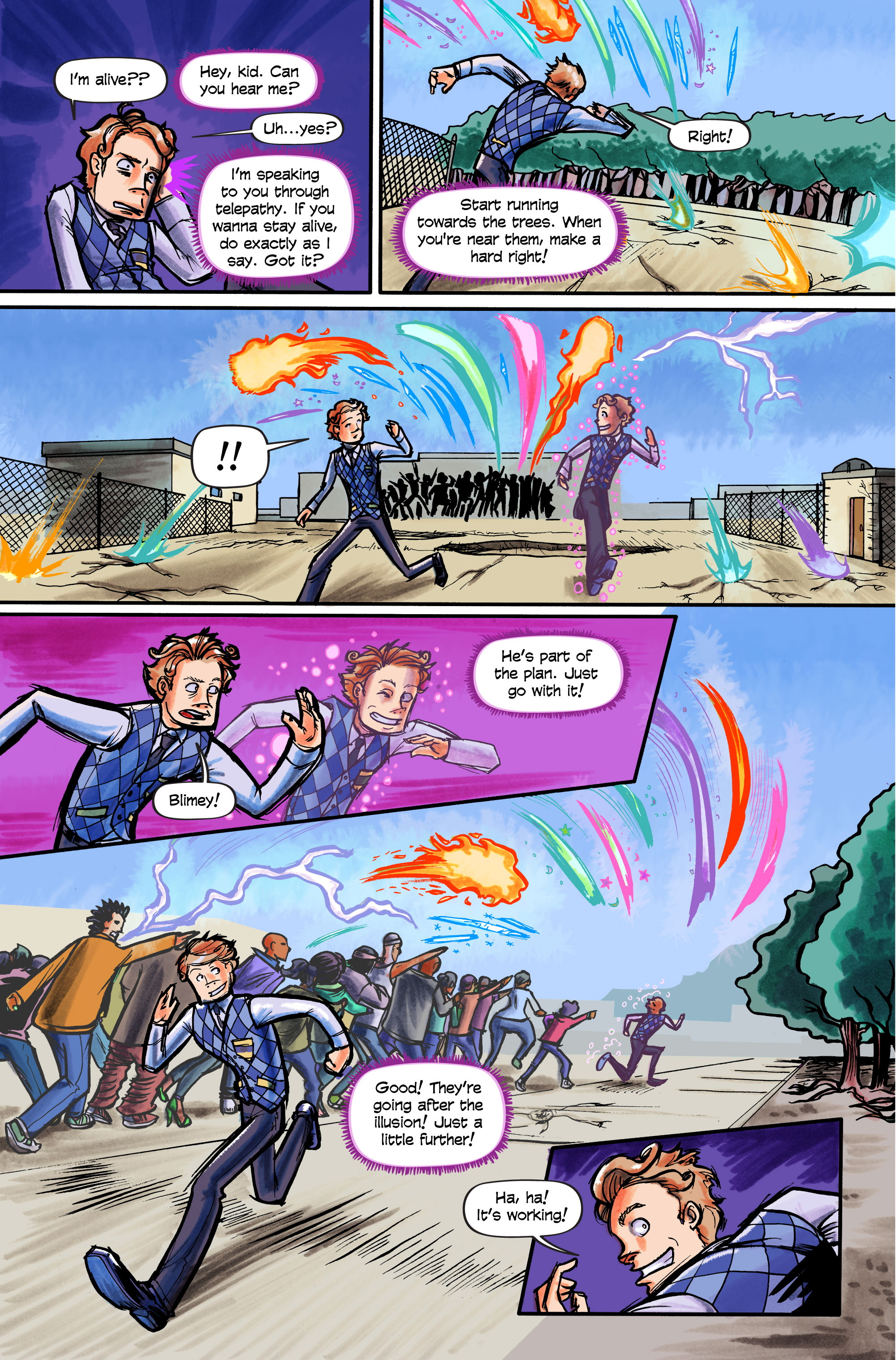 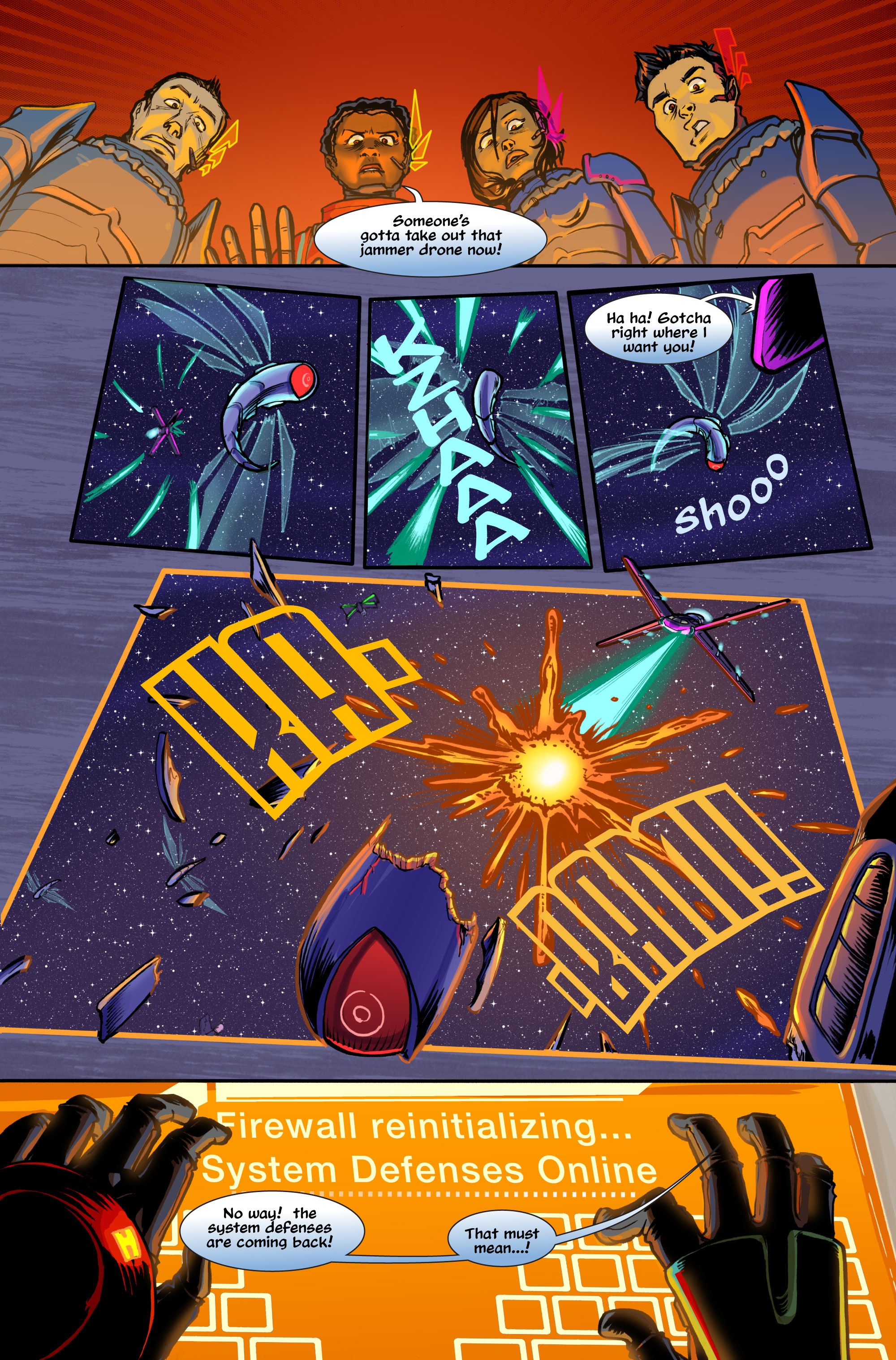  |
November 2014
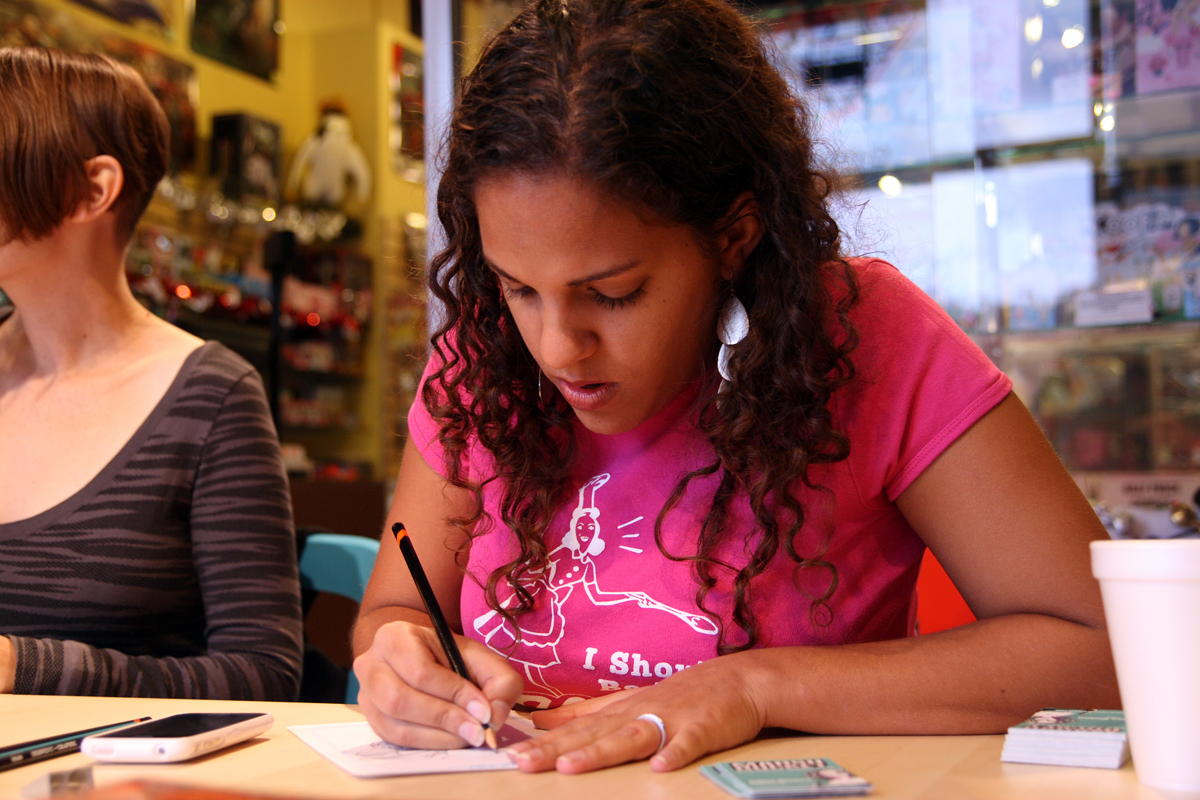
City: Los Angeles California
Comics: Valkyrie Squadron, Misfortune High
Websites: http://www.valkyriesquadron.com, http://misfortunehigh.com
QRD – How old were you when you first got into comics & did you always stick with them or did you come back to them?
Jules – I got into comics when I was about 14 years old. I started with manga & then moved on to more western & independent comics. I never really left.
QRD – What was the first comic book you ever bought?
Jules – Hard to say. I think it might’ve been the graphic novel of Magic Knight Rayearth, but I don’t remember that far back.
QRD – How old were you when you put out your first comic?
Jules – My first webcomics came out when I was 19. My first print comics were done when I was 23.
QRD – What decade do you think produced the best comics?
Jules – Every decade has its charm point, but I think the explosion of independent & webcomics in the last year has been the best time. So many voices & so many points of view are now being heard in a time when the publisher gatekeeper system has begun to slip.
QRD – Why comics instead of just writing or drawing?
Jules – I like long form visual storytelling, but I don’t have the budget to create animation.
QRD – Do you see mini-comics & indie comics as paths to mainstream comics or as their own unique media?
Jules – That all depends on the intent of the creator. Some creators don’t want to break into mainstream comics. However, other creators do some of their best work on the indie circuit before getting picked up by the big publishers.
QRD – How many copies of your comic do you print in your first run?
Jules – Normally a comic I’m printing for the very first time gets a very short run. Usually no more than 50 copies. (God bless print-on-demand.)
QRD – How much do you think comics should cost?
Jules – They shouldn’t be too expensive for newcomers & young readers to jump on board, but they shouldn’t be so inexpensive the creative talent going into it doesn’t get proper compensation.
QRD – How many books do you produce a year & how many would you like to?
Jules – I’d like to put out 3-4 books a year, but these days, I barely produce two ever since I started going full time freelance.
QRD – Do you think stories should be serialized or delivered as complete works?
Jules – That’s like asking me if I like TV shows or movies. One is an ongoing stream of content, while the other is often a one-shot deal. Both have their merits & I’m in no position to tell other creators how to run their ship.
QRD – How are comic strips different than comic books & which medium do you prefer?
Jules – Comic strips don’t have to be any different than comic books or graphic novels. The only real difference is the presentation. I don’t think I prefer either one over the other as long as they’re both used effectively (i.e. storytelling, entertainment, art, etc.).
QRD – How long is it from when you start a comic until it’s printed?
Jules – At least 6 months to a year.
QRD – What do you do better with your comics now than when you first started?
Jules – Everything. I’m a better storyteller, a better draftsman, a better composer, a better marketer. I’ve been at this for a long time. If I didn’t improve at something, that would be a problem.
QRD – Do you do thumbnails?
Jules – I prefer storyboards to thumbnails. I’d rather figure out what goes into each panel & then work out those panels’ page layout than deal with layout first.
QRD – At what size do you draw?
Jules – 11” x 17” at 600 dpi. Mainly because I can.
QRD – What kind of pens do you use?
Jules – Most of my inking is done digitally, so that’s all done with Frenden pens in Manga Studio. However, on the occasions I do ink on paper, I use brush pens & Copic multilines.
QRD – What does your workstation look like?
Jules – Stuffed in a laptop bag these days.
QRD – At what point in the artistic process do you work digitally?
Jules – Everything is digital on everything but Misfortune High. Misfortune High starts with digital pencils, gets printed & inked on a bristol board, & then scanned & colored digitally (sort of).
QRD – What do you think of digital comics & webcomics?
Jules – They were my bread & butter for a long time. I think they’re pretty great.
QRD – Do you prefer working in color or black & white?
Jules – I’m a color beast. My work sings in color.
QRD – How many different people should work on a comic & what should their jobs be?
Jules – However many people it takes. At the very least it helps to have an artist/writer & an editor. It’s also nice not to have to write & draw everything, but sometimes you don’t get the luxury of hiring another creator.
QRD – How do you find collaborators?
Jules – They find me.
QRD – How tight do you think a script should be as far as telling the artist what to draw?
Jules – I like my scripts to be fairly tight. When I write, I break down scripts by pages & then panels. I like having panel descriptions & clear dialogue. This takes out the guessing games when it comes time to draw the comic out. I don’t want to have to figure out how many panels to put on a page or how many pages are in the book. That’s the writer’s job. Even if I am the writer, that should all be solved by the time I get to creating art.
QRD – Do you think it’s important to have a full story arc completely written before starting to draw?
Jules – Perhaps not completely written, but certainly planned with a loose outline. You have to know where your story is going before you start investing artwork into it. The real estate on a page is too expensive not to know what you’re going to do with it.
QRD – What comic book person would you be most flattered to be compared to?
Jules – Amanda Conner would be nice. I really like her bright, active characters.
QRD – What do your friends & family think of your comics?
Jules – It took them a little while to come around & understand what my work was about. However, once they got it, they were really proud of me.
QRD – What do you think of superheroes?
Jules – They sure are super.
QRD – Marvel or DC?
Jules – While I appreciate that DC has been a household name for the better part of a century, I prefer Marvel just because they seem to be more willing to take chances on newer artists with fresh ideas.
QRD – What comic characters other than your own would you like to work with?
Jules – I would split in half if I ever got the chance to work on Storm. Or Rogue/Gambit because of my underlying fondness of the south (or the weirdness thereof).
QRD – Ideally would you self-publish?
Jules – I already have.
QRD – What conventions do you try to attend & why?
Jules – I normally did the southern California conventions when I lived there full time. I mainly worked those shows because they were local. However, the one show I have traveled for is the Latino Comics Expo. That’s become a favorite because it’s very specialized: brown people drawing comics about brown people. The organizers of that show have been very good to me & made me feel like my contributions to the community really matter.
QRD – How do you feel about doing work for anthologies?
Jules – Anthologies are cool. They allow me to stretch my muscles in different ways than I normally do. Often times I’m working on characters or settings I normally wouldn’t, which is pretty cool. & they allow an audience I normally wouldn’t reach to see my work.
QRD – What do you do to promote your books?
Jules – I seem to do okay on social media, working Twitter, Facebook, & Tumblr to get my work out there.
QRD – Do you think your comics are well suited to comic shops or would sell better elsewhere?
Jules – My comics would probably do better in more of a mainstream book store setting or even libraries. Comic shops, while they’re really great & connecting better with individual readers, tend to focus on a specific type of book, which falls outside of my wheelhouse.
QRD – What other medium would you like to see some of your comics made into (television, film, games, action figures, etc.)?
Jules – I would love to see my comics get animated & turned into toys & stuff. That would be wicked.
QRD – Do you consider yourself a comic collector or a comic reader or both?
Jules – I’m a creator. That means I’m sort of all of the above.
QRD – What do you see as the most viable mediums for comics distribution 10 years from now?
Jules – Most likely digital. I believe people will always make room on their shelves for graphic novels, but given the prevalence of tablets & other handheld devices, digital distro seems like the wave of the future.
QRD – What would you like to see more people doing with comics?
Jules – Reading them. That would be great.
QRD – Anything else?
Jules – Wherever you go, there you are.
